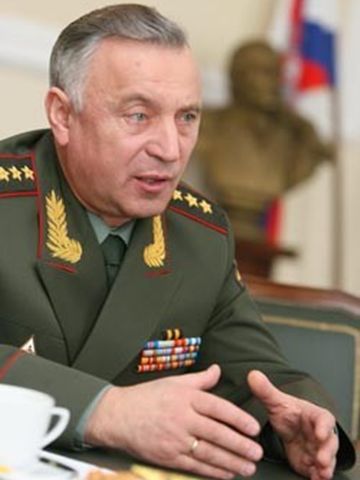
Medvedev Confirms Conscript Shortages
Publication: Eurasia Daily Monitor Volume: 7 Issue: 146
By:

Russia’s attempts to build a modern military have run into a roadblock: there are not enough conscripts to fill the ranks. In the fall of 2008, the Russian military was a reservist/mobilization force. According to the Chief of the General Staff and First Deputy Defense Minister, Army-General Nikolai Makarov, “83 percent of the army” had only officers and weapons and required reservists to fill the ranks that “would have required a lot of time” (www.newsru.com, February 17). The last major use of reservists occurred in 1990, in the North Caucasus Military District, to impose martial law in the Azeri capital Baku, aimed at suppressing the growing separatism. After the collapse of the USSR in 1991, reservists were not called up for combat operations in either Chechnya or Georgia.
Now, according to Makarov, 85 permanent readiness brigades have been formed that are destined to go into immediate action “in one hour.” This transformation required a drastic reduction of the officer corps and praporshiki (warrant officers) and a corresponding increase in the number of soldiers and sergeants. In 2008, there were 1,130,000 active service personnel in the armed forces with about half a million of them officers and praporshiki. Now the armed forces have been reduced to one million, the number of soldiers and sergeants is 726,000, amongst which there are 190,000 contract servicemen (kontraktniki) (www.newsru.com, February 17).
By 2016, the number of officers must be reduced to 150,000 and all praporshiki have already been dismissed, though a number continue to serve as contract sergeants (Interfax, March 5). According to Makarov, the number of kontraktniki will be reduced from the present 190,000 to 150,000 leaving only sergeants and specialists. In the future, the number of contact servicemen may be increased to between 200,000 to 250,000, but now the reduction is needed to dismiss unwanted personnel (Vedomosti, June 10).
Conscript soldiers serve in Russia not only in the defense ministry forces, but also in the interior ministry troops, in the Federal Guard Service (FSO), in the Emergency Situations Ministry (MChS) and other security structures. As conscript service was reduced to one year in 2008, the annual call up has doubled to 600,000. However, in the future only the defense ministry forces will require some 700,000 annually (Voyenno Promyshlennyy Kuryer, July 28). This seems to be impossible, as the number of young men reaching the call up age of 18 is low due to the steep decline of births in Russia in the 1990’s. In 2005 –the best year of the decade– the number of 18 year olds was 1,310,000, and in that year less than 300,000 conscripts were called up to serve for two years. In effect, only volunteers from rural areas and small towns entered service, while the rest found different ways to dodge it by paying bribes for a reprieve on medical grounds or by entering university. In 2009, the number of 18 year olds was 1,090,000; in 2010 it reached 940,000; in 2011 it is expected to be 850,000; and by 2012 it will decline to 740,000. During the rest of the decade there will be less than 700,000 18 year old males annually in Russia (www.gazeta.ru, July 28).
The demographic problem of finding enough soldiers to man a combat ready force is made worse because in Russia the more educated and wealthy classes actively avoid conscription. Opinion polls show that 46 percent of Russians consent to their relatives being drafted, while 42 percent say they will seek ways to evade it (Vedomosti, July 27). The reduction of service to one year in 2008 did not reduce the number of those who actively avoid service. Some 70 percent believe that the draft must be abandoned, and Russia should have a purely contract-based military. According to the main military prosecutor’s office, the number of reported incidents of hazing in the barracks increased by 50 percent in the first five months of 2010 (RIA Novosti, July 21). In Moscow, 40 percent of potential conscripts obtain a reprieve from service on medical grounds and the Mayor, Yuri Luzhkov, has announced that this is unacceptable, saying “it is good to serve” and “the threat of hazing is practically nonexistent” (Interfax, July 20).
On July 15, the so called “spring draft” was completed and 270,600 conscripts, as planned, were called up (Interfax, July 14). Last week President, Dmitry Medvedev, held a secret high-level meeting with the chiefs of militarized ministries and security services about the draft problem. In his opening remarks released to the public, Medvedev announced that Russia’s security is in question, “since we do not fully provide our army and fleet with required conscripts.” Medvedev called for “proposals on what to do next” to be discussed, without naming them (www.kremlin.ru, July 22). The possible “proposals” will surely be unpopular: to call up students, or increase length or maximum age for service.
The present manning crisis makes a mockery of the permanent readiness brigades. Basic military training of conscripts has been reduced to three months from six, and during the recent large-scale operational-strategic exercise, Vostok 2010, in the Far East, some conscripts were involved several weeks after being drafted. During the short war with Georgia in 2008, Russia had several frontline all-contract airborne and army units, but now they have been disbanded (Voyenno Promyshlennyy Kuryer, July 28). Following the introduction of one year conscript service the airborne forces formed five “first use battalions” with 70 percent of contract soldiers “most of whom have combat experience” (RIA Novosti, May 26). These battalions (around two thousand men in total) seem to be all the combat ready forces Russia has today for possible offensive action.
Russia is no longer the totalitarian USSR –it is an utterly corrupt authoritarian bureaucratic state that does not have the capacity to force or terrorize half of its subjects into military service if they have the means to avoid the draft. Medvedev, Luzhkov and others have been talking about escalating patriotic propaganda to defeat public non-cooperation with the draft, there has even been speculation about censoring top officials whose sons dodge, but most likely the manning crisis will only worsen. Ultimately, as the armed forces are increasingly undermanned, an all-volunteer military may be forced by events upon the reluctant Russian authorities.




